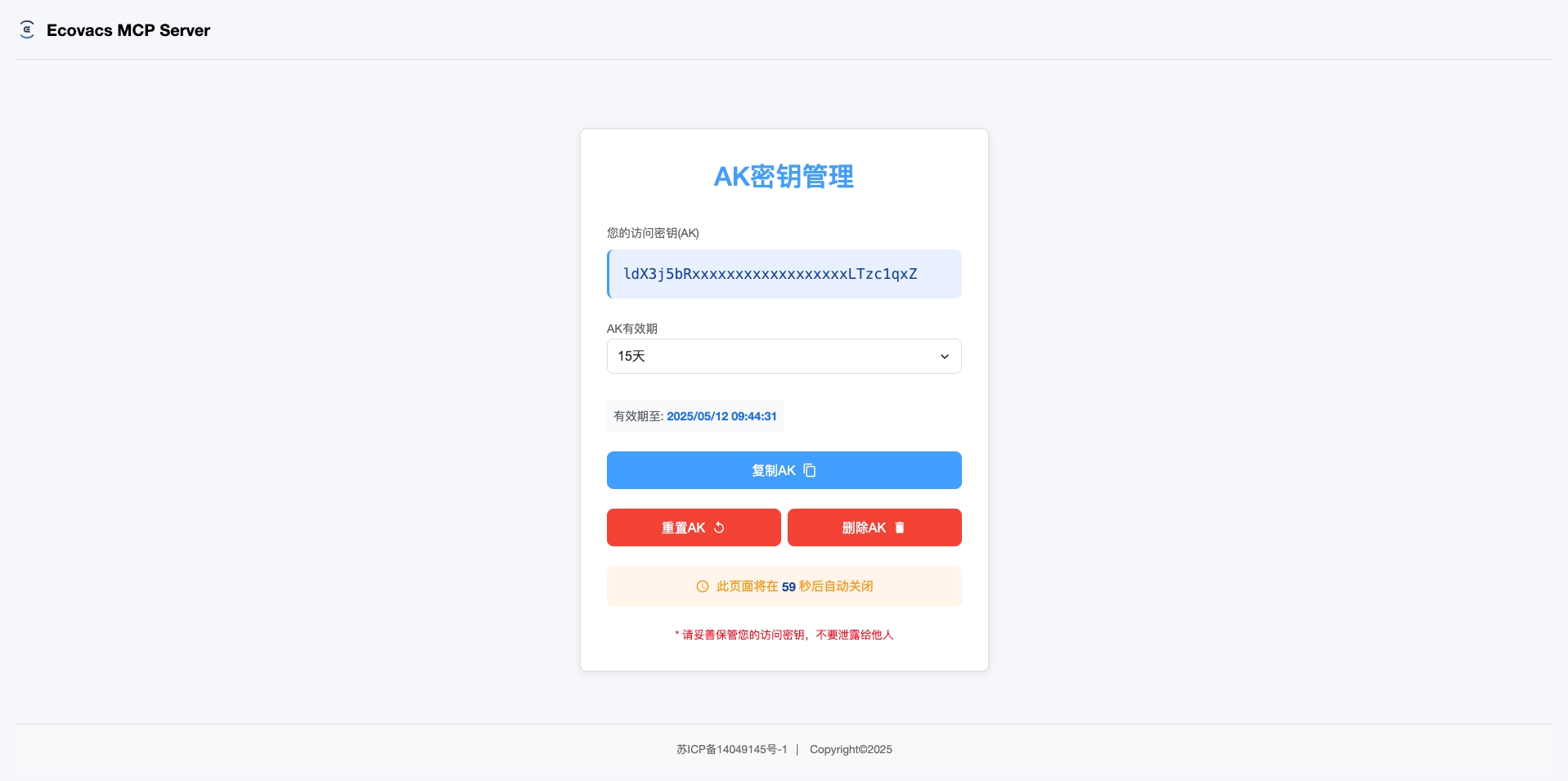About
The Ecovacs MCP Server enables developers to control and monitor Ecovacs vacuum robots—listing devices, starting/stopping cleaning, managing charging, and querying status—through the Model Context Protocol for seamless AI integration.
Capabilities

Overview
The Ecovacs MCP Server brings the world’s first MCP‑compatible robot vacuum platform into the AI assistant ecosystem. By exposing a small but powerful set of RESTful endpoints over the Model Context Protocol, it allows large language models to discover, command, and monitor Ecovacs robotic vacuums with a single line of configuration. This dramatically lowers the barrier for developers who want to add real‑world physical interaction to conversational agents, turning a simple chatbot into an intelligent home automation hub.
What Problem Does It Solve?
Traditional robot vacuum APIs are fragmented, require custom SDKs, and demand manual handling of authentication tokens and endpoint URLs. Developers must write bespoke integration layers to translate natural language intents into HTTP calls, manage state polling, and interpret status codes. The Ecovacs MCP Server abstracts all of that complexity behind a standard MCP interface: a declarative tool set that any compliant AI client can invoke. This removes the need for custom code, reduces latency in intent resolution, and ensures consistent error handling across different models.
Core Capabilities
- Device Enumeration – Retrieve the full list of user‑bound robots, enabling agents to ask “Which vacuums do I own?” or “Start cleaning the living room.”
- Cleaning Control – Issue start, pause, resume, or stop commands with fuzzy nickname matching.
- Charging Management – Direct the robot to return to its dock or abort charging, giving agents fine‑grained power control.
- Status Query – Fetch a comprehensive snapshot of cleaning, charging, and docking states in a single call, allowing the assistant to answer questions like “Is the vacuum currently cleaning?” or “How long until it’s fully charged?”
All tools return JSON responses with clear status codes, making them easy to parse and embed in conversational flows.
Use Cases & Real‑World Scenarios
- Smart Home Assistant – A user can say, “Clean the kitchen and then return to the dock,” and the assistant will orchestrate both actions without any manual API calls.
- Routine Scheduling – An agent can schedule daily or weekly cleanings, monitor completion, and alert the user if a charging issue occurs.
- Multi‑Device Coordination – In households with several vacuums, the assistant can dispatch each unit to a specific room or task based on user preference.
- Maintenance Alerts – By continuously polling status, the assistant can notify owners of low battery or docking problems before they become critical.
Integration with AI Workflows
Because the server exposes tools through MCP, any client that supports the protocol—Claude, Gemini, or others—can load the Ecovacs MCP Server with a simple configuration snippet. The client automatically discovers available tools, presents them in the prompt, and passes user intents directly to the server. Developers can then focus on crafting higher‑level dialogue logic, knowing that all robot interactions are handled by a robust, officially supported backend.
Unique Advantages
- First‑Mover in the Space – Ecovacs is the first robot manufacturer to fully support MCP, giving developers immediate access to a widely used brand.
- Zero‑Code Integration – No SDKs, no custom wrappers—just declarative tool definitions that work out of the box.
- Secure, Token‑Based Authentication – API keys are managed through Ecovacs’s own portal, ensuring that only authorized clients can issue commands.
- Cross‑Regional Access – Separate host URLs for mainland China and the rest of the world allow seamless global deployment without additional networking headaches.
In short, the Ecovacs MCP Server transforms a consumer robot vacuum into a first‑class AI‑controlled device, enabling developers to build richer, more interactive applications with minimal effort.
Related Servers
MindsDB MCP Server
Unified AI-driven data query across all sources
Homebrew Legacy Server
Legacy Homebrew repository split into core formulae and package manager
Daytona
Secure, elastic sandbox infrastructure for AI code execution
SafeLine WAF Server
Secure your web apps with a self‑hosted reverse‑proxy firewall
mediar-ai/screenpipe
MCP Server: mediar-ai/screenpipe
Skyvern
MCP Server: Skyvern
Weekly Views
Server Health
Information
Explore More Servers
MCP Server Templates
Zero‑configuration deployment of Model Context Protocol servers.
Google Sheets MCP Server
Automate Google Sheets via Model Context Protocol
Office Word MCP Server
AI‑powered Microsoft Word document management and editing
Mindmap MCP Server
Convert Markdown to interactive mind maps in minutes
Crypto Exchange MCP Server
Real‑time crypto market data for Bybit, OKX, and Binance
Mcp Json Db Collection Server
Multi‑database JSON storage with Fireproof sync